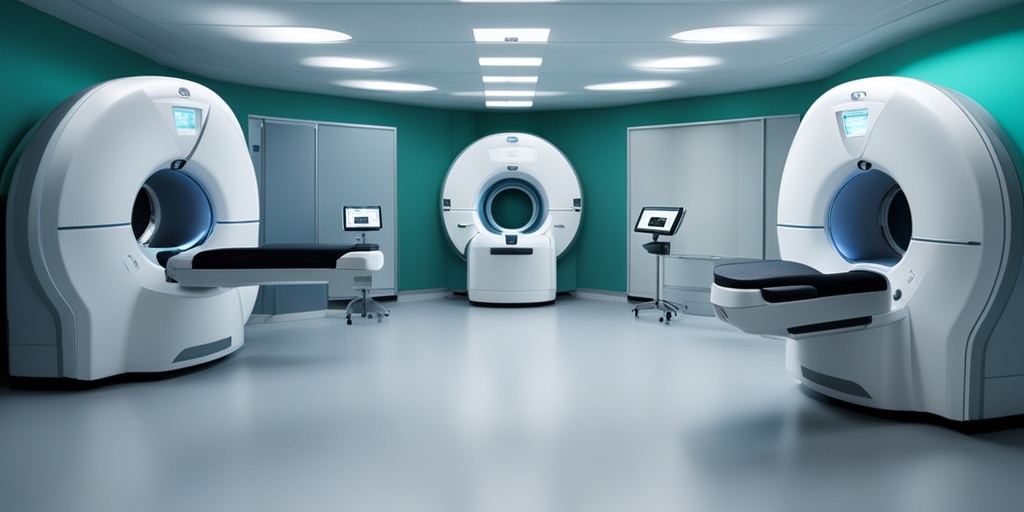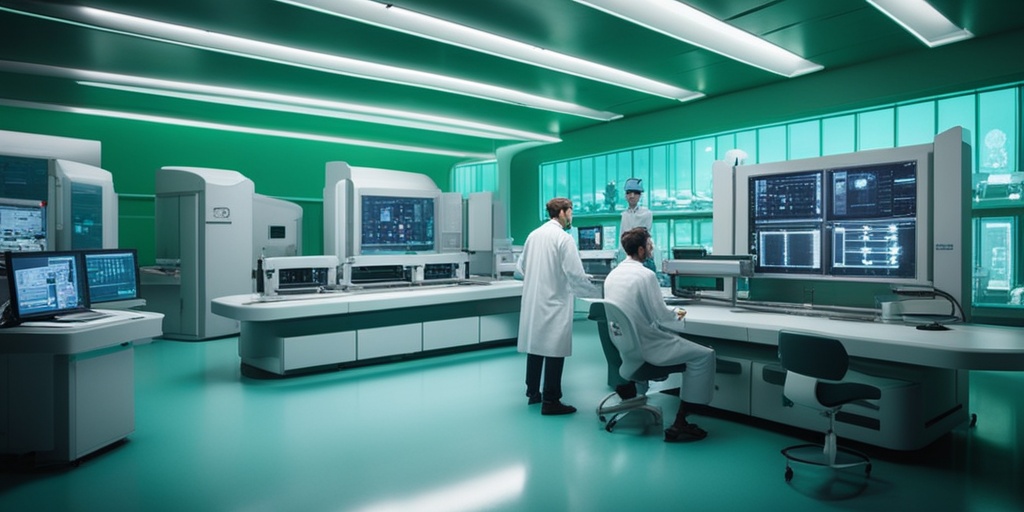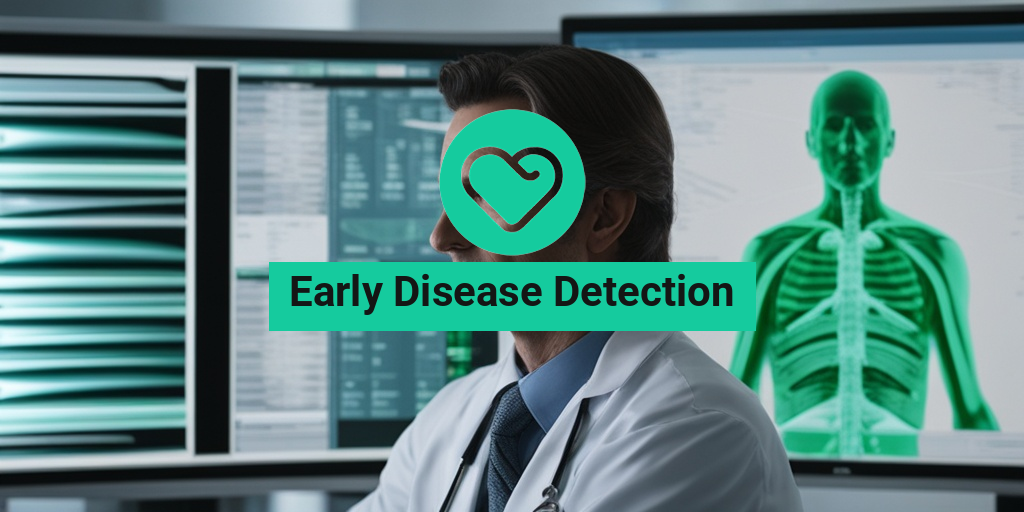What is Early Disease Detection?
Early disease detection refers to the process of identifying a medical condition or disease in its initial stages, often before symptoms appear or when they are still mild. This approach enables healthcare professionals to intervene early, providing timely treatment and potentially preventing the progression of the disease.
The Role of AI in Early Disease Detection
With the advent of artificial intelligence (AI), early disease detection has become more accurate and efficient. AI-enhanced technologies, such as machine learning algorithms and computer vision, can analyze medical images, patient data, and other health information to identify patterns and anomalies that may indicate the presence of a disease. For instance, AI-powered X-rays can help detect cancer cells at an early stage, allowing for prompt treatment and improving patient outcomes.
Organizations like Yesil Health AI are at the forefront of developing AI-driven solutions for early disease detection, providing healthcare professionals with valuable tools to make informed decisions and improve patient care.
Importance of Early Disease Detection
Early disease detection is crucial for several reasons:
Improved Treatment Outcomes
Identifying a disease early allows for timely intervention, which can significantly improve treatment outcomes. In many cases, early treatment can lead to better management of the disease, reduced symptoms, and even complete remission.
Enhanced Patient Survival Rates
Early disease detection can be a lifesaver. According to the American Cancer Society, the 5-year survival rate for cancer patients increases significantly when the disease is detected at an early stage. For example, the 5-year survival rate for breast cancer patients is around 99% when the disease is detected at stage 1, compared to around 27% when it’s detected at stage 4.
Reduced Healthcare Costs
Early disease detection can also help reduce healthcare costs. By identifying and treating diseases early, patients can avoid costly hospitalizations, surgeries, and other expensive interventions. Additionally, early detection can help prevent complications and reduce the need for long-term care.
Improved Quality of Life
Early disease detection can significantly improve a patient’s quality of life. By detecting diseases early, patients can avoid debilitating symptoms, reduce their risk of disability, and maintain their independence for longer.
In conclusion, early disease detection is a critical aspect of healthcare that can have a significant impact on patient outcomes, survival rates, and healthcare costs. By leveraging AI-powered technologies and staying informed about the latest advancements in early disease detection, we can work towards a healthier future for all. 💊

Benefits of Early Disease Detection
Early disease detection is a crucial aspect of healthcare that can significantly impact the outcome of various medical conditions. The importance of early detection cannot be overstated, as it can mean the difference between life and death, or at the very least, a significant improvement in the quality of life. So, what are the benefits of early disease detection?
Improved Treatment Outcomes
One of the most significant benefits of early disease detection is that it allows for timely and effective treatment. When a disease is detected early, treatment can begin promptly, which can lead to better outcomes and even a cure in some cases. For example, cancer treatment is much more effective when the disease is detected in its early stages. In fact, the 5-year survival rate for cancer patients is significantly higher when the disease is detected early.
Reduced Healthcare Costs
Early disease detection can also help reduce healthcare costs in the long run. When a disease is detected early, treatment is often less invasive and less expensive. Additionally, early detection can help prevent complications that can arise from untreated diseases, which can lead to costly hospitalizations and treatments.
Enhanced Patient Outcomes
Early disease detection can also lead to enhanced patient outcomes. When a disease is detected early, patients can take proactive steps to manage their condition, which can lead to a better quality of life. For example, patients with diabetes can manage their blood sugar levels and prevent complications when the disease is detected early.
Increased Patient Survival Rates
Early disease detection can also increase patient survival rates. When a disease is detected early, patients can receive timely treatment, which can lead to a higher survival rate. For example, the survival rate for heart attack patients is significantly higher when the disease is detected early.
Common Diseases that Require Early Detection
While early disease detection is crucial for all medical conditions, some diseases require early detection more than others. Here are some common diseases that require early detection:
Cancer
Cancer is one of the most critical diseases that requires early detection. When cancer is detected early, treatment is more effective, and the chances of survival are higher. In fact, the 5-year survival rate for cancer patients is 92% when the disease is detected early.
Diabetes
Diabetes is another disease that requires early detection. When diabetes is detected early, patients can take proactive steps to manage their blood sugar levels and prevent complications. In fact, early detection of diabetes can reduce the risk of heart disease and stroke by 50%.
Heart Disease
Heart disease is a leading cause of death worldwide, and early detection is critical for timely treatment. When heart disease is detected early, patients can take steps to reduce their risk of heart attack and stroke. In fact, early detection of heart disease can reduce the risk of heart attack by 30%.
Alzheimer’s Disease
Alzheimer’s disease is a neurological disorder that requires early detection. When Alzheimer’s disease is detected early, patients can receive timely treatment, which can slow down the progression of the disease. In fact, early detection of Alzheimer’s disease can improve treatment outcomes by 20%.
Early disease detection is a critical aspect of healthcare that can significantly impact the outcome of various medical conditions. By understanding the benefits of early disease detection and the common diseases that require early detection, patients can take proactive steps to manage their health and improve their quality of life. 💊

How to Detect Diseases Early
Detecting diseases early is crucial for effective treatment and improving health outcomes. Early disease detection can make a significant difference in the quality of life for individuals and their families. But how can we detect diseases early? 🤔
The Importance of Regular Check-Ups
Regular health check-ups are essential for early disease detection. These check-ups provide an opportunity for healthcare professionals to identify any potential health issues before they become severe. During a check-up, your doctor may perform routine tests, such as blood pressure and blood sugar level checks, to identify any abnormalities. Additionally, they may ask about your medical history, lifestyle, and any symptoms you may be experiencing.
Know Your Body
It’s essential to be aware of your body and recognize any changes or abnormalities. Keep track of your health metrics, such as your weight, blood pressure, and blood sugar levels. If you notice any unusual changes or symptoms, don’t hesitate to consult your doctor. 📊
Get Screened
Screening tests can help detect diseases early, even if you’re not showing any symptoms. For example, mammograms can detect breast cancer, while colonoscopies can detect colon cancer. Talk to your doctor about which screening tests are appropriate for you based on your age, medical history, and lifestyle. 💉
Stay Informed
Stay informed about your family medical history and any genetic predispositions you may have. This knowledge can help you take preventive measures and be more aware of your health. Additionally, stay up-to-date with the latest medical research and breakthroughs in disease detection and treatment. 📚
Role of Medical Imaging in Early Disease Detection
Medical imaging plays a vital role in early disease detection. Imaging technologies, such as X-rays, CT scans, MRI scans, and ultrasounds, allow healthcare professionals to visualize the body and identify any abnormalities. 📸
Enhanced Diagnostic Accuracy
Medical imaging can help diagnose diseases more accurately and at an early stage. For example, a mammogram can detect breast cancer up to two years before symptoms appear. Similarly, a CT scan can detect lung cancer at an early stage, improving treatment outcomes. 💻
Early Detection of Chronic Diseases
Medical imaging can also help detect chronic diseases, such as cardiovascular disease and diabetes, at an early stage. For example, an ultrasound can detect plaque buildup in the arteries, indicating cardiovascular disease. Early detection of these diseases can help prevent complications and improve treatment outcomes. ❤️
AI-Enhanced Medical Imaging
Artificial intelligence (AI) is revolutionizing medical imaging by enhancing diagnostic accuracy and speed. AI algorithms can analyze medical images quickly and accurately, helping healthcare professionals detect diseases early. For example, AI-enhanced X-rays can detect lung cancer more accurately than traditional X-rays. 🤖
By combining regular health check-ups, self-awareness, screening tests, and medical imaging, we can detect diseases early and improve health outcomes. Remember, early disease detection is key to effective treatment and a better quality of life. 💪

Biomarkers for Early Disease Detection
Imagine being able to detect diseases at their earliest stages, even before symptoms appear. This is the promise of biomarkers, which are biological molecules that can indicate the presence of a disease or condition. In the context of early disease detection, biomarkers play a crucial role in identifying individuals who are at risk of developing a particular disease or condition.
What are Biomarkers?
Biomarkers can be genes, proteins, hormones, or other molecules that are present in the body and can be measured to determine the presence or risk of a disease. They can be found in bodily fluids such as blood, urine, or saliva, or in tissue samples. Biomarkers can be used to diagnose diseases, monitor disease progression, and even predict treatment outcomes.
Types of Biomarkers
There are several types of biomarkers, including:
- Genetic biomarkers: These are genes or genetic variations that are associated with an increased risk of developing a particular disease.
- Protein biomarkers: These are proteins that are produced in response to a disease or condition, such as cancer biomarkers.
- Metabolic biomarkers: These are molecules that are produced as a result of metabolic processes, such as glucose or cholesterol levels.
Examples of Biomarkers in Early Disease Detection
Biomarkers have been identified for a range of diseases, including:
- Cancer biomarkers: Such as PSA (prostate-specific antigen) for prostate cancer and CA-125 for ovarian cancer.
- Cardiovascular disease biomarkers: Such as troponin for heart attacks and B-type natriuretic peptide (BNP) for heart failure.
- Neurological disease biomarkers: Such as amyloid beta for Alzheimer’s disease and alpha-synuclein for Parkinson’s disease.
These biomarkers can be used to detect diseases at an early stage, even before symptoms appear. This allows for early intervention and treatment, which can improve outcomes and reduce the risk of complications.
Advances in Early Disease Detection Technology
Advances in technology have revolutionized the field of early disease detection. From artificial intelligence (AI) to machine learning, these innovations are enabling the development of more accurate and efficient diagnostic tools.
Artificial Intelligence (AI) in Early Disease Detection
AI is being used to analyze large amounts of data, including medical images, genetic data, and electronic health records, to identify patterns and anomalies that may indicate the presence of a disease. AI-powered algorithms can also be used to analyze biomarker data to identify high-risk individuals.
Machine Learning in Early Disease Detection
Machine learning is a type of AI that enables computers to learn from data without being explicitly programmed. In early disease detection, machine learning algorithms can be trained on large datasets to identify patterns and relationships between biomarkers and diseases.
Other Advances in Early Disease Detection Technology
Other advances in early disease detection technology include:
- Next-generation sequencing (NGS): A high-throughput sequencing technology that enables the simultaneous analysis of multiple genes and biomarkers.
- Point-of-care testing: Portable diagnostic devices that enable rapid testing and diagnosis at the point of care.
- Wearable devices: Wearable sensors and devices that can track physiological parameters and detect early signs of disease.
These advances in technology are enabling the development of more accurate, efficient, and accessible diagnostic tools for early disease detection. By combining these technologies with biomarkers, we can identify diseases at an early stage and improve health outcomes. 💡

Frequently Asked Questions about Early Disease Detection
What is Early Disease Detection?
Early disease detection refers to the identification of a disease or condition in its early stages, often before symptoms appear. This allows for timely intervention, treatment, and prevention of complications.
Why is Early Disease Detection Important? 🤔
Early disease detection is crucial because it can significantly improve treatment outcomes, reduce healthcare costs, and enhance patient quality of life. It also enables early intervention, which can prevent or delay disease progression.
How Does AI Contribute to Early Disease Detection? 🤖
Artificial intelligence (AI) plays a vital role in early disease detection by analyzing medical images, such as X-rays and MRIs, to identify patterns and anomalies that may indicate disease presence. AI can also help analyze large amounts of patient data to identify high-risk individuals.
What are the Benefits of Early Disease Detection in Cancer? 🎗
Early disease detection in cancer can significantly improve treatment outcomes, increase survival rates, and reduce mortality. It also enables early intervention, which can prevent or delay cancer progression.
How Can I Get Involved in Early Disease Detection Research? 🔬
If you’re interested in contributing to early disease detection research, consider participating in clinical trials, donating to research organizations, or spreading awareness about the importance of early disease detection.
What is the Role of Biomarkers in Early Disease Detection? 🔍
Biomarkers are biological molecules that can indicate disease presence or risk. They play a crucial role in early disease detection by enabling the identification of diseases in their early stages, often before symptoms appear.
Can Early Disease Detection Prevent Disease Complications? 🚑
Yes, early disease detection can prevent or delay disease complications by enabling timely intervention and treatment. This can significantly improve patient outcomes and reduce healthcare costs.
How Does Early Disease Detection Impact Patient Quality of Life? 💕
Early disease detection can significantly improve patient quality of life by enabling early intervention, reducing treatment side effects, and enhancing overall well-being.
What are the Challenges in Early Disease Detection? 🤔
Some of the challenges in early disease detection include the need for accurate diagnostic tools, access to healthcare, and awareness about the importance of early disease detection.
How Can I Stay Informed about Early Disease Detection? 📚
Stay informed about early disease detection by following reputable health organizations, reading scientific articles, and attending health seminars or workshops.




